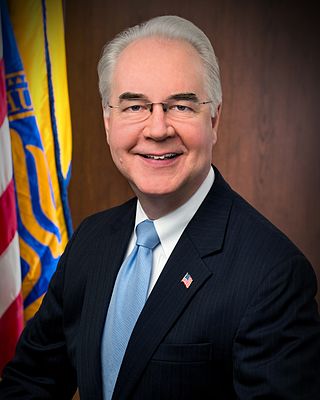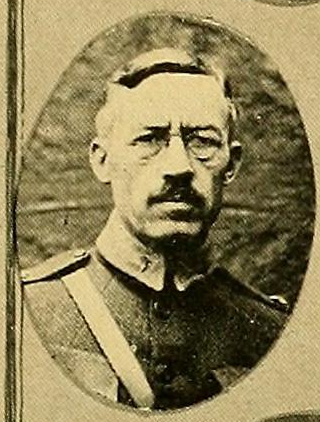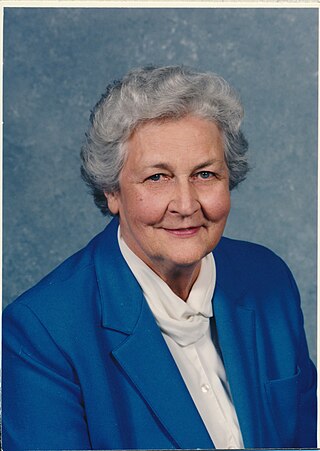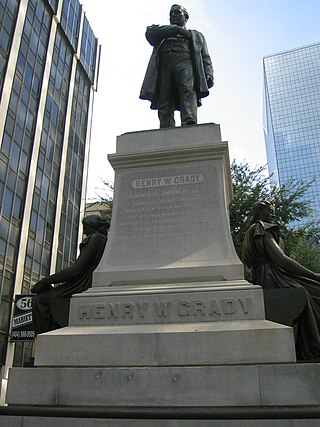
Louis Wade Sullivan is an active health policy leader, minority health advocate, author, physician, and educator. He served as the Secretary of the United States Department of Health and Human Services during President George H. W. Bush's Administration and was Founding Dean of the Morehouse School of Medicine.

The Atlanta Journal-Constitution (AJC) is an American daily newspaper based in metropolitan area of Atlanta, Georgia. It is the flagship publication of Cox Enterprises. The Atlanta Journal-Constitution is the result of the merger between The Atlanta Journal and The Atlanta Constitution. The two staffs were combined in 1982. Separate publication of the morning Constitution and the afternoon Journal ended in 2001 in favor of a single morning paper under the Journal-Constitution name.

The Courier Journal, also known as the Louisville Courier Journal, and called The Courier-Journal between November 8, 1868, and October 29, 2017, is a daily newspaper published in Louisville, Kentucky and owned by Gannett, which bills it as "Part of the USA Today Network".

Henry Woodfin Grady was an American journalist and orator who helped reintegrate the states of the Confederacy into the Union after the American Civil War. Grady encouraged the industrialization of the South, with his coined term,"The New South". He was praised by contemporaries and by authors Shavin and Galphin as a civic promoter, political strategist and captivating speaker, and by Atlanta journalist Frederick Allen as a visionary. However, in modern times, Grady's arguments for the need for white supremacy in the post–Civil War South have resulted in his legacy being seen as mixed and overtly racist. Grady's name has been removed from several schools including Atlanta's former Grady High School. Grady was the father-in-law of Federal Reserve Chairman Eugene Robert Black and grandfather of banker and World Bank President Eugene R. Black Sr.

Thomas Edmunds Price is an American physician and Republican Party politician who served as the U.S. representative for Georgia's 6th congressional district, encompassing the northern suburbs of Atlanta, from 2005 to 2017. While in Congress, Price chaired the House Committee on the Budget, Republican Study Committee and Republican Policy Committee. He was appointed Secretary of Health and Human Services by President Donald Trump and served in that role from February to September 2017.

Grady Memorial Hospital is the public hospital for the city of Atlanta. The hospital is ranked as the tenth largest public hospital in the United States and is a Level I trauma center.

Cyrus Warren Strickler Sr. was an American physician and professor of clinical medicine at Emory University. He served in the United States Army Medical Corps during World War I.

King George Hospital is an NHS hospital located on Barley Lane in the Goodmayes area of Ilford, in the London Borough of Redbridge. The hospital is part of Barking, Havering and Redbridge University Hospitals NHS Trust.
Grady EMS is an emergency care provider owned by Grady Healthcare System, established in 1892 in Atlanta, Georgia.

Grady Edward Clay Jr was an American journalist and urbanist specializing in landscape architecture and urban planning.

Pamela Sturdivant Stephenson was an American politician from Georgia. Stephenson was a Democratic member of Georgia House of Representatives representing the state's 90th district, which includes parts of DeKalb and Rockdale counties. On September 10, 2020, Stephenson's daughter submitted a resignation on her behalf due to dementia.

Neil Barnett Shulman was an American doctor and medical writer, who was an Associate Professor in the School of Medicine at Emory University. He conducted and published clinical research on hypertension and was the co-founder of the International Society on Hypertension in Blacks. He was also the author of many books promoting medical literacy for both adults and children, as well as humour and children's books. He was the associate producer of the 1991 film Doc Hollywood, based on one of his books.

The 1920 College Football All-Southern Team consists of American football players selected to the College Football All-Southern Teams selected by various organizations for the 1920 Southern Intercollegiate Athletic Association football season.

Mary Florence Woody was an American nurse, hospital administrator and university professor. She worked as a director of nursing at two large hospitals and was a nursing school dean or associate dean at Auburn University and Emory University. She was designated a Living Legend of the American Academy of Nursing.

Christopher Michael Carr is an American lawyer and politician. A Republican, he is the current Attorney General of Georgia. In 2016, Governor Nathan Deal appointed Carr as Attorney General to fill a vacancy created by the departure of former Attorney General Sam Olens. Carr was elected to a four-year term in Georgia's 2018 statewide elections. He won a second term in the 2022 Georgia Attorney General election.

St Barnabas Hospital is a non-profit teaching hospital founded in 1866. The hospital is located in the Belmont neighborhood of The Bronx in New York City. It is a level II adult trauma center and is a major clinical affiliate for clinical clerkship of the New York Institute of Technology College of Osteopathic Medicine.

The COVID-19 pandemic was first detected in the U.S. state of Georgia on March 2, 2020. The state's first death came ten days later on March 12. As of April 17, 2021, there were 868,163 confirmed cases, 60,403 hospitalizations, and 17,214 deaths. All of Georgia's 159 counties now report COVID-19 cases, with Gwinnett County reporting over 85,000 cases and the next three counties now reporting over 56,000 cases each.

The Henry W. Grady statue is a monumental statue of Henry W. Grady in Atlanta, Georgia, United States. Built by Alexander Doyle in 1891, the statue lies at the intersection of Marietta Street and Forsyth Street in downtown Atlanta and was unveiled shortly after Grady's death in 1889. The statue has recently been the subject of controversy, as several groups have called for its removal due to Grady's support of white supremacy.
Ernie Suggs is an American journalist with The Atlanta Journal-Constitution who writes about race and culture. He also writes about the Carter Center and former President Jimmy Carter. He oversees AJC Sepia, the newspaper's Black news curation site and the Unapologetically ATL newsletter. He has written about people and history of the civil rights movement and the challenges faced by historically black colleges and universities.

Greg Bluestein is an American journalist, author and TV analyst who covers Georgia politics for The Atlanta Journal-Constitution. He has also written about former President Jimmy Carter and covered regional and national news as an Atlanta-based journalist for The Associated Press. He contributes to the Political Insider blog, is an MSNBC and NBC News contributor, and is host of the Politically Georgia podcast.


















